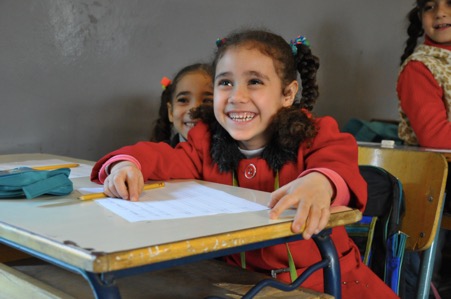- Posted on : September 21, 2016
- Posted by : Tom Fletcher
An age of migration is coinciding with an age of mistrust, with the political consequences we see every day in our elections and media. The wall builders feel they have momentum. The bridge builders and coexisters find ourselves anxious and in retreat.
So this week of meetings in New York have been about whether those with a vision of global cooperation and tolerance can fight back. Or are we going to be shouted down, or buried beneath diplomatic platitudes?
The education of the 75m young people out of school is the frontline of that battle. It is heartening that the Education Cannot Wait Fund now gives us a mechanism to respond, deploying resource fast to get education to those displaced. It is a bold and innovative disruption of the existing humanitarian machinery, and a recognition that education has too often lagged behind the wider humanitarian response.
GBC-Education pledged to rally the private sector behind the plans. Classic donor contributions are important but insufficient. The systems we have designed since 1945 can no longer cope, especially when some governments can’t deliver on their pledges, or are buffeted by the short termism of 24/7 news cycle and social media FOMO. Few governments are becoming more strategic.
The battle to educate a generation is not about money alone, but a new, collaborative way of responding. A way of engaging business that is about corporate social results, not just corporate social responsibility.
Our research shows that the main obstacles to global education are lack of school buildings, textbooks and teaching materials, Internet connectivity, trained teachers, school transport, and the logistics to get education to communities on the move.
So we want to see if engineering companies can offer to provide the school buildings, working with struggling governments. If education providers can supply the essential books for quality learning. Social media giants can work with local telephone providers to set up high-speed Internet connectivity, allowing pupils to access digital content on phones, iPads and tablets. Teacher organizations can mobilize volunteers to supplement teachers, on the ground and online. Universities can identify positions for displaced students and faculty at US and European universities. Transport companies can provide free transportation for pupils and teachers. The smartest innovators can lend their time to crack the problems that governments can’t. Logistics companies and couriers can mobilize to ensure that key materials and cash transfers reach pupils fast. Consultancy companies can offer pro bono staff time to help coordinate the overall effort, and to monitor and evaluate the impact. Other companies can come together to fund a top-level team of coordinators to support the UN and host government.
This would be a crisis response model that is genuinely collaborative, innovative and effective. A way of marshalling business, individuals, NGOs, the UN and governments in meaningful partnerships. Businesses are telling us they are up for it, and desperate for a more coherent, results-driven effort. The key is that anyone and everyone can help.
We are just at the beginning of this effort, but we have been pleased with the response since we launched the initiative. Consultancy companies such as Boston Consulting Group have come forward to offer time and brainpower on the practical problems holding back education provision. Technology companies such as Google, Microsoft and ITWORX Education are offering significant in-kind support. Venture capitalists such as Alfanar are refocusing their portfolios towards education in crisis. Business leaders are offering their personal leadership, and to mobilize their networks. Big global brands such as Carrefour, Unilever and Hewlett Packard are providing logistic support on the ground. NRS International has pledged tents and shelter for schools. In Jordan, engineering companies are working with USAID and the Jordanian government to build new schools. Coalitions of companies such as Techfugees, the UK/Lebanon Tech Hub and Alt City are bringing ingenuity and time to the challenge. Universities such as Kiron and New York are opening up places for students and faculty, backed by companies such as BMW. Others are pledging finance directly to the Education Cannot Wait fund, for research, humanitarian action and recruitment.
Already over thirty companies have already joined our REACT (Rapid Education Action) Datahub, offering to be on the frontline of this crisis. Much depends on where the next crisis hits, and who can deploy their assets in the most effective way. But we have momentum. When we get the call from those coordinating the response, we will be ready to mobilize this coalition in support.
We now want to put this new system to the test. We are asking donors and governments to identify the gaps in the existing education response. We want tangible, practical requests for support that we can take to our members, partners and the wider private sector. That way we can see if this model works, and – if so - scale it up so that business can better play its role at the heart of the education response.
If we get this right, the people traffickers and terrorist recruiters miss out. We will get education to many of the 75m young people out of school, who will go on themselves to be teachers, doctors, entrepreneurs. Business will have a pool of talent from which to recruit and build. The next Einstein, Marie Curie, Mandela or Gates will make the scientific, medical, political or technological breakthrough that changes our lives.
Photograph credit: Theirworld - Refugee Syrian Children attending a double-shift school in Lebanon

